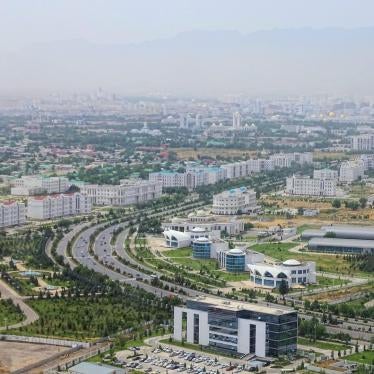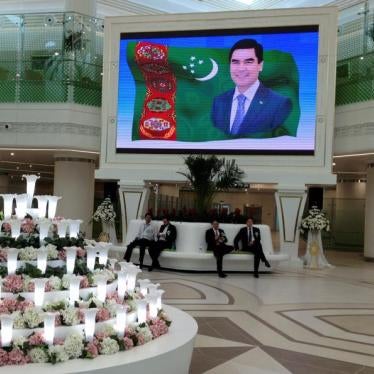To: Sir Suma Chakrabarti, President
EBRD
One Exchange Square
London EC2A 2JN
United Kingdom
14 June 2019
Re: Turkmenistan Country Strategy 2019-2024
Dear Mr. Chakrabarti,
We are writing on behalf of Human Rights Watch, International Partnership for Human Rights and Turkmen Initiative for Human Rights regarding the new draft country strategy for Turkmenistan for the years 2019-2024. We are grateful for the opportunity to provide comments in writing, in follow-up to the consultation meeting held with civil society in November 2018, in which our representatives also participated.
In this letter, we argue that the EBRD should not expand its programs in Turkmenistan to public sector lending until the government has demonstrated that its stated commitment to human rights and democracy has translated into concrete and measureable progress, resulting in real life improvements for the citizens of Turkmenistan. We also argue that the EBRD should use human rights benchmarks recently adopted by the European Parliament to measure Turkmenistan’s progress in this area, emphasizing that the fulfillment of the benchmarks will determine the Bank’s level of engagement in the country. We believe that clearly communicated and implemented conditionality is the most effective approach to promoting democracy and human rights reforms that really matter in Turkmenistan and that can facilitate and support the transition to market-based economy in the country.
In addition, we offer a number of comments on the draft strategy’s assessment of the current human rights situation in Turkmenistan, as well as on its section on environmental and social implications of the Bank’s involvement in the country.
A Consistent Set of Benchmarks
The draft country strategy accurately describes the dire situation with respect to democracy and human rights in Turkmenistan. Turkmenistan’s government is one of the most repressive in the world, featuring at the bottom of international freedom rankings---recently Turkmenistan ranked last in Reporters Without Borders’ 2019 World Press Freedom Index. Its authorities systematically violate the fundamental rights and freedoms of its citizens. Our organizations have repeatedly documented how the Turkmen authorities rigidly control national media, restrict access to the internet and other alternative sources of information, and intimidate, harass and imprison government critics.
Taking into account government repression, the draft strategy rightly limits EBRD investment to support only Turkmenistan’s fledgling private sector. However, the strategy also states that it will “consider supporting, in a carefully measured and targeted manner, concrete, well-defined initiatives of the Government to reform the public sector should a credible commitment to reform materialise.” We urge the EBRD to set out concrete benchmarks against which the government’s commitment to democracy and human rights reforms would be measured in order to assess whether there has been sufficient progress to justify such investment. Specifically, we urge the Bank to endorse the set of benchmarks adopted by the European Parliament on 12 March 2019 and to use these benchmarks when monitoring, assessing and measuring progress in the political area in Turkmenistan (in accordance with the EBRD’s Article 1 mandate). We also urge the Bank to use its leverage to advocate reforms in areas set out in these benchmarks and to make the government’s progress on implementing them a condition for any extension of the Bank’s involvement in Turkmenistan to include public sector lending. Until there has been real, credible progress towards the benchmarks, we urge the Bank to continue to suspend any public sector investment in the country.
Notes on the Draft Strategy’s Assessment of Turkmenistan in accordance with the EBRD’s Article 1 Mandate
The draft country strategy states that “Turkmenistan’s commitment to and application of the political principles in Article 1 of the Agreement Establishing the Bank remain the subject of concern by relevant international bodies, despite some efforts by the authorities to improve the constitutional and legislative framework over the period covered by the previous County Strategy.” It also states that international bodies “continue to express deep concern about the actual conditions for democracy and human rights in Turkmenistan” and “have frequently concluded that there is a wide gap between the principles set out in official documents and their application in practice.”
Our organizations share these concerns and have deep reservations regarding the genuineness and effectiveness of the government’s ostensible reforms, including those described as “positive steps” in the draft strategy (in the Executive Summary and in paragraph 2 of the annex on ‘Political Assessment in the Context of Article 1’).
First, the draft strategy states that “[a]mendments to the Constitution in 2016 strengthened the provisions relating to human rights.” However, as the draft strategy also notes, the constitutional reform further cemented the presidency’s domination over other branches of power. Moreover, the new constitution did not ban censorship nor guarantee the right to travel abroad. The Turkmen government did not incorporate recommendations from the Office for Democratic Institutions and Human Rights of the Organization for Security and Co-operation in Europe (OSCE) on the constitutional amendments.
Further, the draft strategy commends the government for establishing the office of the Human Rights Ombudsperson, as well as more actively engaging with international human rights institutions. While we too applaud the establishment of the office of the Human Rights Ombudsperson, we are concerned that the Turkmen authorities have failed to ensure the institutional independence of this office in accordance with the Paris Principles. Moreover, the office has had a low profile, and Turkmen civil society representatives have expressed disappointment that the office has not responded adequately to their petitions. As regards Turkmenistan’s engagement with international institutions, it is a welcome first step that the national authorities have submitted required reports to UN human rights bodies and participated in the review sessions of these bodies. However, constructive engagement also requires effective implementation of the recommendations of UN bodies, which has been lacking in Turkmenistan’s case. For example, Turkmenistan’s “acceptance” of many of the recommendations made during the Universal Periodic Review (UPR) of the country in 2018, which the draft strategy says "has been widely welcomed”, appears to have been an empty gesture. The government delegation refused to acknowledge the problems underlined by key recommendations it claimed to support, and it did not support other key recommendations, saying instead that it “will examine” these.
Another important element of constructive UN engagement is cooperation with UN special mechanisms and facilitating country visits of such mechanisms when requested. In Turkmenistan’s case, over a dozen requests for visits by special procedures are pending, some of them since more than a decade. The government has agreed to a visit by the Special Rapporteur on Cultural Rights, but the visit – initially planned for 2018 – has been postponed. Thus, the Special Rapporteur on the right to religion or belief is the only mandate holder to have visited the country to date – in 2008.
For the reasons described above, we suggest that the Bank refrain from asserting that the “positive steps” mentioned in the Executive Summary and in paragraph 2 of the Political Assessment of the draft strategy have contributed to bringing Turkmenistan’s institutions and legislation in line with international standards. Instead, the Bank should note that while the Turkmen authorities have portrayed these steps as bringing the country’s institutions and legislations in line with international standards, in practice it has not been demonstrated that those steps have led to concrete improvements.
We also suggest that the draft strategy not only refer to the lack of concrete human rights improvements since 2014 but also notes that the situation, in some respects, has deteriorated further in the last five years. In particular, in the context of the current economic crisis, the Turkmen authorities have further stepped up measures to suppress the dissemination of information challenging state propaganda, including by pressuring journalists working with foreign media, civil society activists and others speaking up about problems in the country, as well as their family members. These individuals have been subjected to surveillance, arbitrary restrictions on their communication and movement, intimidation, attacks by unknown perpetrators committed with impunity, detention and imprisonment on politically motivated grounds. In another problematic development, TIHR has learned about a growing number of cases in which the authorities have arbitrarily restricted citizens’ travel abroad, barring those considered “disloyal” and “unreliable” from leaving the country. Unofficial government blacklists of people banned from travelling abroad are believed to feature hundreds of people.
We were pleased to see that the Bank strategy included the issue of enforced disappearances. We ask that the Bank clarify the description of this issue. According to the Prove They Are Alive coalition, currently more than 100 people remain disappeared within the Turkmen prison system, with family members not having received any information about the fate and well-being of these individuals for years. The draft strategy rightly cites the concerns of the UN Human Rights Committee regarding “secret detention and enforced disappearance of a large number of convicted and imprisoned persons, including those convicted for alleged involvement in the assassination attempt on the former President.” The draft strategy states the government’s engagement with the UN Working Group on Enforced or Involuntary Disappearances “holds out the prospect of progress in the future.” It is important to note that time is of the essence on this issue, as the sentences of many of the disappeared are set to expire in the next two years. Meanwhile, there has been no further action on the government’s engagement with the Working Group, and there have been no changes in the government’s position and practices. We believe that the Bank should emphasize that meaningful progress on this issue requires that the Turkmen government takes effective measures to end the practice of enforced disappearances, as well as that it provides information about the fate and whereabouts of all those who have disappeared in prison and grants them prompt access to their lawyers and family members.
A Concern about Private Lending
The draft strategy’s section on Environmental and Social Implications rightly identifies the need for clients to “improve consultation and information provision” with people affected by land acquisition, involuntary resettlement, and economic displacement. It also states the need for clients to ensure compensation and livelihood restoration where occupiers have no legal titles. Our research into expropriations, forced evictions and demolitions for construction projects found that in many cases, evicted residents do not receive adequate compensation, and in some cases receive no compensation at all for their homes.
The problem is serious and widespread. Prior to lending to projects that would involve house clearances, the Bank should ensure that the government has fulfilled the recommendations we have made in this field: to ensure that Ashgabat homeowners and residents who have been forcibly evicted get fair and adequate compensation for the loss of their property and costs incurred due to the forced evictions, and that they immediately take steps to provide Ashgabat residents who were denied compensation, or who were left homeless because of the city’s infrastructure and beautification projects, access to an effective judicial mechanism capable of promptly and fairly awarding them their compensation and any other appropriate remedy.
We thank you for your attention to the issues raised in this letter and would be happy to provide additional information if needed.
Sincerely,
Human Rights Watch
International Partnership for Human Rights
Turkmenistan Initiative for Human Rights
|
Letter
Joint Letter: Turkmenistan Country Strategy Review by the EBRD
Your tax deductible gift can help stop human rights violations and save lives around the world.
Region / Country
Most Viewed
-
June 3, 2025
“They’re Ruining People’s Lives”

-
January 25, 2024
“We’re Dying Here”

-
November 25, 2019
A Dirty Investment

-
April 27, 2021
A Threshold Crossed

-
November 19, 2012
Losing Humanity




